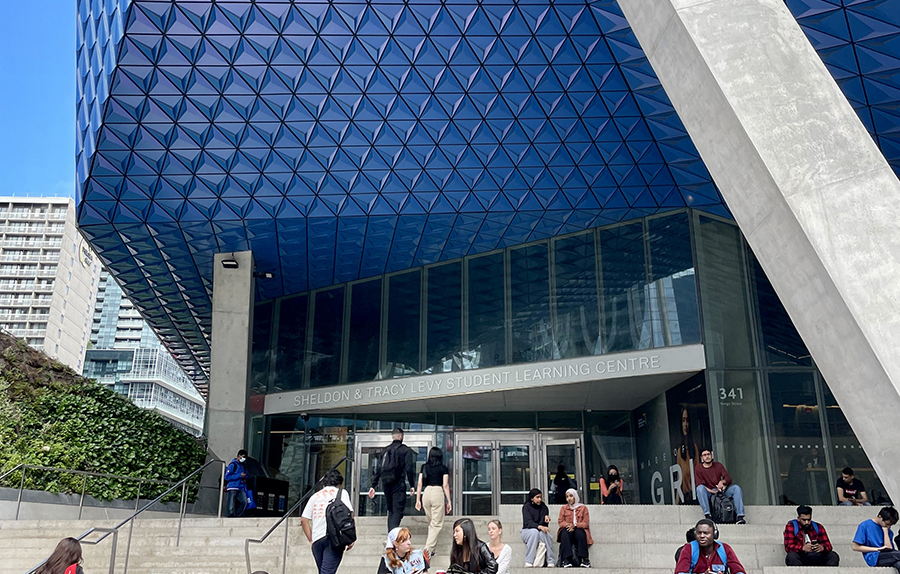
Listen to the story here:
Diamond and Diamond law firm has initiated a lawsuit against Toronto Metropolitan University and its’ student union, the TMSU, which represents the university’s full-time undergraduate students. The lawsuit alleges that both groups repeatedly failed to address a “well-documented history of anti-Semitic sentiments on the TMU campus.”
In a press release published Nov. 2, the law firm stated they have launched similar lawsuits against the University of British Columbia and Queens University, in addition to a lawsuit launched last month against York University. Each lawsuit seeks damages totalling $15 million.
All four lawsuits follow student-led protests and statements across university campuses, arising from the escalation of the conflict in Israel and Palestine, where it is estimated that more than 10,000 people have been killed in the past month.
Who is part of the “class”?
In the statement of claim sent to On The Record by the law firm, Diamond and Diamond says they are representing all current Jewish TMU students, all Jewish TMU students who attended the university within the last two years and all Jewish students who attended TMU between 1998 and 2021.
Darryl Singer, head of class actions at Diamond and Diamond Lawyers, said the differentiation between the second and third groups has “nothing to do with the type of antisemitism experienced,” but rather “simply has to do with some legal technicalities.”
In Ontario, class action lawsuits are opt-out only. This means if the lawsuit is certified by the court, an opt-out period will follow whereby anyone in the defined class (in this case, any current or former Jewish TMU students dating back to 1998) will have the opportunity to opt out of being part of the lawsuit. This allows any opted-out students to pursue individual legal action, or not to pursue any action at all.
Singer said it’s anyone’s right to opt out of the lawsuit, but he anticipates that very few people will.
“We’ve received hundreds of calls from current and former students at [TMU],” said Singer. “I don’t anticipate anybody opting out at this point. Certainly, the calls we’ve received are overwhelmingly positive; everybody wants to be added to the mailing list for the class.”
What are the allegations?
The statement of claim alleges several instances of antisemitic and anti-Israel behaviour on TMU campus and at TMSU-led events. Some instances date back to 2014.
The statement of claim lists the now-rescinded open letter from TMU law students criticizing the school’s response to the conflict, alleging that TMU had not disciplined any of the students who drafted or signed the letter. Since the launch of the lawsuit, TMU has announced that an external review of the matter, led by retired Chief Justice J. Michael MacDonald, will be conducted.
The statement of claim lists alleged instances of harassment of Jewish students at pro-Palestine protests on campus and alleges that TMU staff and administration did not intervene or respond to those acts of hate.
The statement of claim also mentions the TMSU’s decision to join the Boycott, Divestment, and Sanctions (BDS) Movement in 2014. The BDS Movement – which over 20 Canadian post-secondary student unions and the Canadian Federation of Students all support – calls for the boycotting of Israeli products and institutions in an attempt to “end international support for Israel’s oppression of Palestinians and pressure Israel to comply with international law.” It is inspired by the boycotts that were a part of the South African anti-apartheid movement.
The statement of claim goes on to allege that “Jewish students have also repeatedly raised concerns relating to antisemitic graffiti and other hate-motivated activities at the TMU campus. For instance, in 2015, graffiti was found in the Ryerson washroom calling for Jews and all their supporters to ‘burn in hell.’”
Additionally, the statement of claim lists various actions and events that allegedly resulted in Jewish TMU students feeling discriminated against and excluded from student activities, and says the university failed to respond to such events in an appropriate manner. None of these claims have been proven in court.
What have been the responses from TMU and the TMSU?
As of Monday afternoon, Singer said that the law firm had heard from TMU’s defence counsel, but was still waiting for a response from the TMSU.
In an email statement to On The Record, TMU said, “as this matter is before the courts, the university cannot provide comment on the case.”
The statement goes on to encourage students who have experienced discrimination or harassment to reach out to TMU officials, and says, “all TMU community members have a shared responsibility for ensuring a culture of respect and inclusion.”
Similarly, in an email statement to On The Record, TMSU President Marina Gerges said that “TMSU is working with outside counsel and will vigorously defend its record in the appropriate forum. Beyond that, we are not able to address the specific allegations in the lawsuit as they are before the courts.”
The TMSU statement also defended the union’s commitment to its mandate of “empowering students and building community on TMU’s campus.”
Where will the $15 million go?
In addition to the implementation of policies which aim to address antisemitism on their campuses, all four lawsuits against the Canadian universities are seeking each university to pay a total of $15 million in damages. In the initial Diamond and Diamond press release, Singer is quoted saying, “this lawsuit is not driven by monetary objectives, but rather to ensure such incidents do not recur.”
In an interview with On The Record, Singer explained that the funds would likely be donated to Holocaust education groups and organizations that work to combat antisemitism.
“Ultimately, if there’s a monetary settlement, it’s up to the representative plaintiffs in the case to decide where that money would be directed,” said Singer. “But certainly, there are a handful of Jewish organizations that everybody in the Jewish community knows very well, and that would all be worthy recipients and would use the money specifically for the kind of education that’s needed on campus.”
What happens now?
Once Diamond and Diamond receives responses from the defence counsels of TMU and the TMSU, the law firm can move the case towards a certification hearing, where it officially becomes a class action suit. The length of this process can vary, but Singer said he expects the case to reach certification within the next six to 12 months.
Once the case is certified, it will be up to the parties involved to decide on how they would like to proceed, such as through mediation or an actual court trial.
Can we expect to see more lawsuits against other universities?
Singer said that Diamond and Diamond received messages from students and alumni from universities across Canada following their initial lawsuit against York University. Now pursuing lawsuits against four universities, he said that more can be expected in the coming days.
“I can tell you that I have another [lawsuit] going to be issued this week, and I have at least one more coming next week,” said Singer. “I don’t know what other firms are doing, but the short answer is this: You will see several more of these.”
Reporter with On The Record, fall 2023

